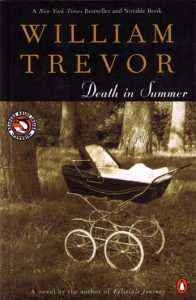 William Trevor is an Irish writer – “Irish in every vein” – and one of the world’s best living short story writers, worthy to be mentioned with the likes of Alice Munro. He took up writing late in life, publishing his first book in his early 30s, but has since been prolific in his output, adding some two dozen novels and a further two dozen story collections. Death In Summer, the first novel of his I have read, is one of the most recent, but in tone and spirit it belongs to the early 20th century.
William Trevor is an Irish writer – “Irish in every vein” – and one of the world’s best living short story writers, worthy to be mentioned with the likes of Alice Munro. He took up writing late in life, publishing his first book in his early 30s, but has since been prolific in his output, adding some two dozen novels and a further two dozen story collections. Death In Summer, the first novel of his I have read, is one of the most recent, but in tone and spirit it belongs to the early 20th century.
Our protagonist is Thaddeus Davenant, whom Trevor describes as:
[…] a spare, handsome man in his mid-forties, with pale brown eyes beneath hair that almost matches them. Inheritor of a property set in the flatlands of Essex, he has been solitary even in marriage, this the legacy of an unusual childhood, compounded by his choosing to eke out a livelihood selling the produce of his garden rather than seeking to discover a vocation or otherwise claiming a profession.
A less charitable description might be that he is a man who has never left his childhood home and never shown any ambition in his vocation. When he surprises himself by marrying the daughter of a wealthy family, Letitia Iveson, late in life, Letitia’s mother is understandably unenthused by the match. The novel begins six years into this marriage, shortly after the birth of their first child – “with difficulty, and after several disappointments.” Marriage into a wealthy family has improved Thaddeus’ financial situation but brought with it its own problems: though he admires her deeply, he does not love his wife, and an old flame, a woman who left him for another, wealthier man, has fallen on hard times and has been importuning him, via letter, for money. And with the stage thus set, and expectations high, Trevor looks to fate alter the trajectory of his narrative: Thaddeus’ wife Letitia is killed off ten pages into the novel, struck by a car while riding her bike.
This “death in summer” shifts things drastically. The reluctant father has become a widower, and must take sole responsibility for his daughter. His mother-in-law initially suggests he take on a full-time nanny, and in the process of interviewing candidates he meets Pettie, a young girl raised in a foster home who quickly develops an unhealthy infatuation with Thaddeus. Here Trevor expands his narrative to encompass both Pettie and her foster home friend Albert, who has taken on a kind of custodial role in her life. We learn that together they ran away from their foster home, and have both been working odd jobs ever since: Albert doing manual labor, Pettie working as a babysitter. But there are dark revelations, too. Pettie’s former employers refuse to give her a recommendation “because of that business with the necklace,” and gradually Trevor hints at a history of sexual abuse dating back to the foster home, when Pettie would have been a young girl:
‘I would give you the world, Pettie,’ her Sunday uncle used to whisper, the first to call her by that name. His loving little princess, he whispered, the only one there would ever be for him. It was Eric who said he was old enough to be her father, and then said he was busy now.
Accidental physical contact with Thaddeus brings this thought on, and it vanishes just as quickly. This is one of Trevor’s coups: the contrast between the regular, orderly narrative of Thaddeus and the disjointed, allusive narrative of Pettie. It also softens our perspective on her when she begins to fantasize about him, to call his home in the hopes of speaking to him and, ultimately, to stalk him and abduct his child.
Attentive readers, or rereaders, will have noticed some hints of this behaviour in Thaddeus’ narrative, as when he returns home one day and “glimpses for an instant a flash of something white and blue – a child, it seems like, hurrying on a little used right-of-way through the fields. Even in the distance there is a familiar look about the figure, but Thaddeus does not pause to wonder why that is.” This is authorial brilliance: Trevor presents us Pettie as she appears to Thaddeus, and Thaddeus, not being a cad, sees her as she is, as a child, a girl, someone unfit for romantic consideration. When a moment later presents itself for her to steal Thaddeus’ child, Trevor once again presents these events through two separate narratives. From the perspective of Thaddeus and his mother-in-law, an evil person has kidnapped a young child, likely out of spite or greed. But just as the reader threatens to accept this explanation, Trevor re-introduces Albert, Pettie’s guardian, who insists on a more sympathetic interpretation. Death In Summer takes the plot elements of a thriller and co-opts them for his own purposes, and the result is an affecting and effective tragedy.